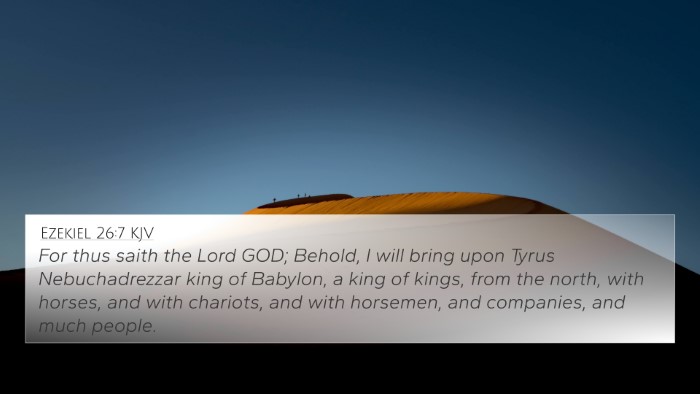Ezekiel 32:11 - Summary and Interpretation
Ezekiel 32:11 declares, "For thus saith the Lord God; The sword of the king of Babylon shall come upon thee." This verse is part of a prophecy delivered by the prophet Ezekiel regarding the impending judgment upon Egypt and its Pharaoh.
Meaning of Ezekiel 32:11
This verse chiefly conveys the notion of divine judgment. It signifies a critical moment when God uses Babylon as His instrument of justice against Egypt, illustrating His sovereignty over nations and the power dynamics among them.
Insights from Public Domain Commentaries
-
Matthew Henry:
Matthew Henry explains that the impending invasion of Babylon is a direct result of the idolatrous practices and the corrupt leadership of Egypt. He highlights that the 'sword' symbolizes the war and devastation that will come upon the land as a form of punishment for their transgressions.
-
Albert Barnes:
Albert Barnes emphasizes the certainty of the prophecy coming to pass. He notes that the "sword of the king of Babylon" represents not just the physical army but also God's judgment. The prophecy serves a dual purpose: a warning to Egypt and affirmation of God's control over historical events.
-
Adam Clarke:
Adam Clarke elaborates on the historical context, noting that this verse came during a time of grave sinfulness in Egypt. Clarke asserts that the specific mention of Babylon's sword underscores God's discipline of nations as part of a broader divine plan for Israel and the world.
Related Bible Cross-References
Ezekiel 32:11 connects to several other Biblical texts that reflect on the themes of judgment and divine sovereignty:
- Jeremiah 25:9: "Behold, I will send and take all the families of the north, and Nebuchadnezzar the king of Babylon..." - Here, God's use of Babylon as a tool for judgment is reiterated.
- Ezekiel 30:24: "...and I will strengthen the arms of the king of Babylon, and the arms of Pharaoh shall fall down..." - This cross-reference emphasizes the contrast between Egypt's strength and Babylon's dominance.
- Isaiah 19:4: "And the Egyptians will I give over into the hand of a cruel lord..." - A prophetic warning that further supports the notion of Egypt's downfall through foreign powers.
- Habakkuk 1:6: "For, lo, I raise up the Chaldeans..." - The Chaldeans being synonymous with Babylonians aligns with the theme of impending judgment.
- Amos 6:14: "But, behold, I will raise up against you a nation, O house of Israel..." - Another illustration of God bringing judgment through foreign nations.
- Ezekiel 21:25-27: "And thou, profane wicked prince of Israel... I will overturn, overturn, overturn it..." - This reinforces God's sovereign control over the fate of nations.
- Revelation 17:16: "And the ten horns which thou sawest upon the beast, these shall hate the whore..." - Though symbolic, it connects to the judgment themes seen throughout prophecy.
Thematic Connections and Understanding
The verse encourages readers to explore the thematic connections within Scripture. The concepts of judgment, divine sovereignty, and the rise and fall of nations recur throughout the Bible, helping to understand God's overarching plan and the consequences of turning away from Him.
How to Use Bible Cross-References
To further grasp the implications of Ezekiel 32:11, consider these approaches:
-
Comparative Bible Verse Analysis: Study the mentioned cross-references to identify patterns and themes that illustrate God's consistent message throughout Scripture.
-
Tools for Bible Cross-Referencing: Utilize a Bible concordance or cross-reference guide to locate related verses and enhance your understanding of Biblical themes.
-
Bible Reference Resources: Leverage available resources to dive deeper into specific terms and symbols used within Ezekiel and related scriptures.
Conclusion
Ezekiel 32:11 serves as a potent reminder of God's justice and control over historical events through human actions. Understanding this verse and its context invites believers to see the interconnectedness of Scripture and the importance of repentance and obedience to God. By engaging in cross-referencing and thematic exploration, one can deepen their insights and enrich their spiritual journey.








